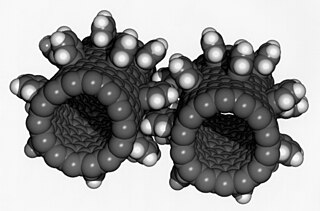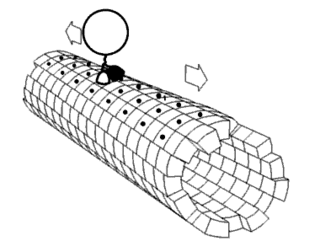
Nanotechnology was defined by the National Nanotechnology Initiative as the manipulation of matter with at least one dimension sized from 1 to 100 nanometers (nm). At this scale, commonly known as the nanoscale, surface area and quantum mechanical effects become important in describing properties of matter. The definition of nanotechnology is inclusive of all types of research and technologies that deal with these special properties. It is therefore common to see the plural form "nanotechnologies" as well as "nanoscale technologies" to refer to the broad range of research and applications whose common trait is size. An earlier description of nanotechnology referred to the particular technological goal of precisely manipulating atoms and molecules for fabrication of macroscale products, also now referred to as molecular nanotechnology.
Nanomedicine is the medical application of nanotechnology. Nanomedicine ranges from the medical applications of nanomaterials and biological devices, to nanoelectronic biosensors, and even possible future applications of molecular nanotechnology such as biological machines. Current problems for nanomedicine involve understanding the issues related to toxicity and environmental impact of nanoscale materials.
Robert A. Freitas Jr. is an American nanotechnologist.

Nanoid robotics, or for short, nanorobotics or nanobotics, is an emerging technology field creating machines or robots whose components are at or near the scale of a nanometer. More specifically, nanorobotics refers to the nanotechnology engineering discipline of designing and building nanorobots with devices ranging in size from 0.1 to 10 micrometres and constructed of nanoscale or molecular components. The terms nanobot, nanoid, nanite, nanomachine and nanomite have also been used to describe such devices currently under research and development.
ISO 4 is an international standard which defines a uniform system for the abbreviation of serial publication titles, i.e., titles of publications such as scientific journals that are published in regular installments.

Sathyabama Institute of Science and Technology (SIST), formerly Sathyabama University, is a private deemed university, situated at Chennai, Tamil Nadu, India. It was founded in 1987 as Sathyabama Engineering College by the late Jeppiaar, and received its university status in 2001.
The impact of nanotechnology extends from its medical, ethical, mental, legal and environmental applications, to fields such as engineering, biology, chemistry, computing, materials science, and communications.
The following outline is provided as an overview of and topical guide to nanotechnology:
The European Technology Platform on Nanomedicine is a European Technology Platform initiative to improve the competitive situation of the European Union in the field of nanomedicine, the application of nanotechnology to medicine.
Because of the ongoing controversy on the implications of nanotechnology, there is significant debate concerning whether nanotechnology or nanotechnology-based products merit special government regulation. This mainly relates to when to assess new substances prior to their release into the market, community and environment.

NanoMission is a serious game series made by PlayGen for Wellcome Trust and FEI to teach the player about the world of nanomedicine. There are four downloadable modules available, each teaching different concepts related to nanotechnology. The gameplay varies greatly between the different modules in the series offering a wide variety of gameplay.
Nanomedicine: Nanotechnology, Biology and Medicine is a peer-reviewed medical journal published bimonthly by Elsevier. It covers research on nanoscience and nanotechnology applied to the life sciences and medicine. This includes basic, translational, and clinical research. Publishing formats include original articles, communications, reviews, perspectives, notes, and letters to the editor. The Editor in Chief is Professor Tatiana K. Bronich, PhD
Vladimir Petrovich Torchilin is a Soviet, Russian and American biochemist, pharmacologist, and an expert in medical nanotechnology. Torchillin is a University Distinguished Professor of Pharmaceutical Sciences at Northeastern University. He also serves as a director at both the Center for Translational Cancer Nanomedicine and at the Center for Pharmaceutical Biotechnology and Nanomedicine at Northeastern University.
The International Institute for Nanotechnology (IIN) was established by Northwestern University in 2000. It was the first institute of its kind in the United States and is one of the premier nanoscience research centers in the world. Today, the IIN represents and unites more than $1 billion in nanotechnology research, educational programs, and supporting infrastructure.

Nanomedicine is a biweekly peer-reviewed medical journal covering research on medical nanoscale-structured material and devices, biotechnology devices and molecular machine systems, and nanorobotics applications in medicine. It was established in 2006 and is published by Future Medicine. The editors-in-chief are Kostas Kostarelos and Charles R. Martin.
Open Medicine may refer to medical journals:

The characterization of nanoparticles is a branch of nanometrology that deals with the characterization, or measurement, of the physical and chemical properties of nanoparticles. Nanoparticles measure less than 100 nanometers in at least one of their external dimensions, and are often engineered for their unique properties. Nanoparticles are unlike conventional chemicals in that their chemical composition and concentration are not sufficient metrics for a complete description, because they vary in other physical properties such as size, shape, surface properties, crystallinity, and dispersion state.
Occupational medicine is the branch of medicine which deals with the maintenance of health in the workplace. It may also refer to:
Patrick Couvreur, born 1950 in Schaerbeek (Brussels), is a French pharmacologist who specialises in medical nanotechnology and is currently professor at the University of Paris-Sud.
Moein Moghimi is a British professor and researcher in the fields of nanomedicine, drug delivery and biomaterials. He is currently the professor of Pharmaceutics and Nanomedicine at the School of Pharmacy and the Translational and Clinical Research Institute at Newcastle University. He is also an adjoint professor at the Skaggs School of Pharmacy, University of Colorado Denver.





